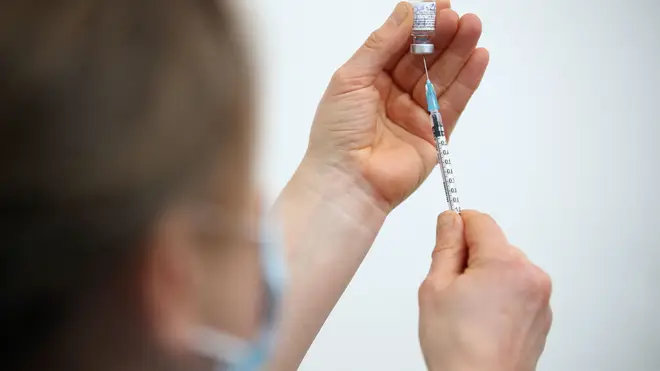
Richard Spurr 1am - 4am
17 August 2021, 00:30 | Updated: 17 August 2021, 00:36

There is no evidence to indicate Covid-19 vaccines affect fertility or the ability to have children, the UK's medical regulator has said.
There is also no suggestion any of the vaccines used in the UK, or reactions to them, increase the risk of miscarriage or stillbirth, the Medicines and Healthcare products Regulatory Agency (MHRA) added.
In an update published on Monday, the MHRA said: "There is no evidence to suggest that Covid-19 vaccines will affect fertility and the ability to have children."
READ MORE: Fully vaccinated and under-18s no longer need to isolate if in contact with Covid case
READ MORE: 'Faith healer' in court accused of selling bogus Covid-19 'plague protection kits'
It said the numbers of reports of miscarriages and stillbirth are "low in relation to the number of pregnant women who have received Covid-19 vaccines to date and how commonly these events occur in the UK outside of the pandemic".
The regulator added: "There is no pattern from the reports to suggest that any of the Covid-19 vaccines used in the UK, or any reactions to these vaccines, increase the risk of miscarriage or stillbirth.
"There is no pattern from the reports to suggest that any of the Covid-19 vaccines used in the UK increase the risk of congenital anomalies or birth complications."
"Pregnant women have reported similar suspected reactions to the vaccines as people who are not pregnant," it added.

Pfizer, Moderna and AstraZeneca: The Coronavirus Vaccines Explained
The MHRA said it is currently reviewing reports of suspected side effects of menstrual disorders and unexpected vaginal bleeding after being vaccinated, but has so far found nothing to support a link between changes to menstrual periods and related symptoms and coronavirus jabs, adding "the menstrual changes reported are mostly transient in nature".
Pregnant women who do get symptomatic Covid-19 are two to three times more likely to give birth to their baby prematurely.
In April, the Joint Committee on Vaccination and Immunisation (JCVI) updated its guidance to say that pregnant women should be offered a Covid-19 jab at the same time as the rest of the population based on their age and clinical risk group.
Last month, health officials encouraged pregnant women to get vaccinated when data published by NHS England and the University of Oxford showed the majority of pregnant women admitted to hospital with the virus had not received a jab.